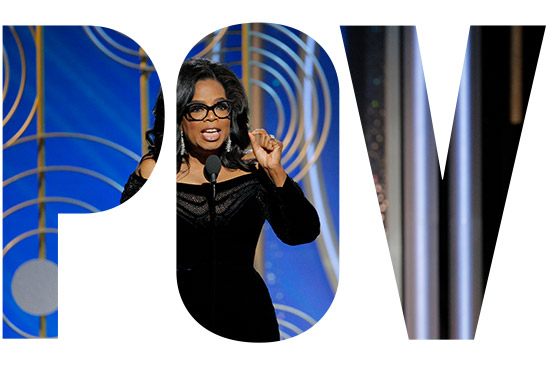POV: Oprah Winfrey and the Oval Office
Is political experience still necessary to be president?

In a year when part of the population appears desperate for a presidential candidate other than the incumbent, we have seen speculation about a succession of different people — from Mike Pence or Elizabeth Warren to Dwayne “The Rock” Johnson, for instance. The riveting speech by the very popular Oprah Winfrey at the Golden Globe Awards ceremony earlier this month created an explosion of speculation about her and advocacy on her behalf, and media reports say she isn’t ruling out the possibility of a 2020 run for office. Some argue we are in a new era when we can leave political experience and expertise behind in searching for the next president of this large, complicated, powerful country. Is this true?
Winfrey has long been extremely popular and influential as a television personality, leader of a communications empire, philanthropist, and actress. She has touched the hearts of many people who feel the United States has been plummeted into a free fall from caring about justice for all, inclusion, respect for the press and civil rights and liberties — nothing short of a turn away from democracy. She is, in addition a great performer, as evidenced again during her Golden Globes speech. We know too that she is a voracious reader and a great listener.
Before he became president, Donald Trump was a popular television personality with a large following, a salesman for his own brand who had convinced a large part of the public that he was an extraordinarily successful businessman. He reportedly surprised even himself by winning first the Republican nomination and then the presidency, despite a lack of prior political experience. Even Ronald Reagan, best known as an actor, had been head of a large union and governor of one of the country’s largest and most complex states before his successful run for president. But research shows that Trump did not just pull in Republican votes — he touched the hearts of many people, especially among white people and those outside the major cities who felt they had been abandoned by the country’s leadership.
Once in office and through with the fervor of election season, Trump’s lack of political experience and expertise became evident. Regardless of what one thinks about his political views, he proved ignorant of how the federal government and the White House work. He didn’t know that there would not be a single holdover person working there when he entered the White House and that he would have to hire them all. His personnel staffing—more turnover in the first year than in any other modern presidency—and his demonstrated lack of knowledge about the complicated policies he now has to deal with, make life difficult for others around him in government who are trying to make this large and complicated government work.
Some people have suggested that if we have a president with little experience, that person can become just a symbolic figure, a figurehead, leaving governing to others. But leaving government to nonelected officials is not democratic. Further, this president’s lack of knowledge supports his preference for an autocratic, personalistic approach to leadership—no figurehead.
We must ask ourselves what would happen if we pursue another candidate with little or no governmental experience. But even experienced new presidents drink out of the proverbial fire hose. We can’t be sure what a Winfrey administration would be like. It would be a wild card, despite what we know about her political views, which are stable; her smarts, which are considerable; and her communication skills, which are superb. Part of the answer as to what would happen would depend on which party dominates which house of Congress.
But think of this: which of the following would you be happy to have working for you without any experience: (a) your car mechanic, (b) your doctor, (c) your president, (d) your plumber.
The public is free to support any candidate it chooses. The Constitution specifies only that the president has to be at least 35 years old, a natural born citizen, and a resident of the United States for a minimum of 14 years. As the saying goes, “Any little boy can become president of the United States.” (We have not yet seen a little girl grow up to be president, so that part is not yet clear.) Oprah Winfrey can no doubt gather a lot of support.
If Winfrey is interested, she has two major tasks ahead of her (other than dialing for dollars and collecting delegates): she must study as she hasn’t since she learned her lines and moves for her most challenging movie part. She will need a large group of great minds in different areas of governance and policy. Second, she must get involved in a big way in the 2018 congressional elections to forge connections and loyalties with Democrats across the nation.
And then, she would have to convince the nation that a woman — and a black woman at that — should become president of the United States.
Virginia Sapiro is a College of Arts & Sciences professor of political science; she can be reached at vsapiro@bu.edu.
“POV” is an opinion page that provides timely commentaries from students, faculty, and staff on a variety of issues: on-campus, local, state, national, or international. Anyone interested in submitting a piece, which should be about 700 words long, should contact Rich Barlow at barlowr@bu.edu. BU Today reserves the right to reject or edit submissions. The views expressed are solely those of the author and are not intended to represent the views of Boston University.
Comments & Discussion
Boston University moderates comments to facilitate an informed, substantive, civil conversation. Abusive, profane, self-promotional, misleading, incoherent or off-topic comments will be rejected. Moderators are staffed during regular business hours (EST) and can only accept comments written in English. Statistics or facts must include a citation or a link to the citation.